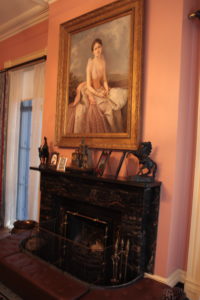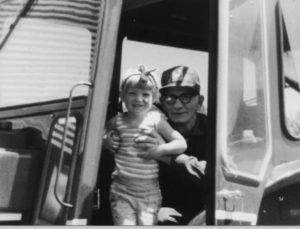The Art of Grief, and Looking Beyond the Girl Scout Cookies
“Grief can destroy you—or focus you.” –Dean Koontz
I was never a Girl Scout.

Portrait of “Daisy” at her home in Savannah
So I don’t know what the average Girl Scout learns about the founder of this more than century-old organization that evolved alongside women’s suffrage.
I just know I found myself standing in a little bit of awe when I learned on a trip to Savannah not so many years ago that “Daisy,” as Juliette Gordon Lowe was fondly known, had founded this organization that today has nearly 3 million members, out of a broken heart.
Betrayed by the man she believed to be her one true love, plagued ironically by deafness due to an accident on her wedding, and then broken by her husband’s early death and a last will and testament that endeavored to leave his estate to his lover rather than his wife, Daisy traveled the world for a time, something of an early 20th century Elizabeth Gilbert, had a chance meeting with the founder of the Boy Scouts of America, and set out to found a similar organization for young women to promote self-reliance and self-esteem.
Out of her mourning, she built a movement, using her deafness to “pretend not to hear” the voices of naysayers.
Lowe is hardly an anomaly. The world is rich with stories of mothers, fathers, husbands, and wives who have had hearts broken by tragedy, death, deceit, terminal illness, conflict, and plague and have risen to become activists for change—to give purpose to their pain.
Frankly, however, the vast majority of us run from it, letting it, as Dean Koontz suggests, “destroy” rather than “focus” us. We numb, we block out, we shut down, and often we resolve to never give access to vulnerability again.
Doing so, frankly, goes against nature. When children lose something they love, they wail, they pound their fists, they feel, and then, strangely at times, they are fine again, all the pain released, equanimity returned.

With Grandpa the summer before he died
I remember when, at just under six years of age, I experienced the death of my maternal grandfather—a skinny, relentless smoker who moved as lithely and quickly as a fox, talked fast, lived large, and pulled me into his lap when he had his afternoon coffee, sending curls of smoke before my eyes as he fed me cookies and termed me his “little cocklebur.” I adored him with the fullness of my soul.
And then he died of a heart attack, and I never got to say good-by.
In the stiff Scandinavian way of my family, there was not much in the way of tears the night of his wake. I had been taught from a young age to eschew any displays of emotion. But as the evening of convening around his casket wore on and the night grew long, my great aunt and uncle gathered me and my three cousins into their car to take us home while the rest of the adults stayed behind.
Sitting like sad little sardines in the back seat of Great Uncle Ross’ car, the four of us girls were quiet until my youngest cousin, Chrissy, began to wail. As clearly as if it was yesterday, I hear my own little voice rising into the darkness: “Why is Chrissy crying?”
And then soon, the whole backseat was a flood of tears, all four of us girls weeping for the man who had hiked us onto his shoulders, given us rides in the combine, and settled onto the floor with us to put together doll carriages and Lincoln logs. The release….
By the time we arrived back at my grandparents’ house, we had settled into a state of tentative calm, playing Barbies on the living room floor.
That night was not the last time I cried for my grandfather. Sometimes I will cry for him to this day.
What I learned that night so many long years ago, however, yet forgot in young adulthood, and had to learn all over again, was that grief is not a thing to fight.
Fighting it only pushes it forward another day, and then another, until soon, you’ll find yourself years after the fact still a mess of only subtly covered bones, and fear, and regret, prone to stupid decisions, denial, and sometimes…resistance…to ever being in a place where grief could possibly take hold.
Trust me. I have done it. And lived to tell the tale of what it is like to be so cut off from feeling that not only did I feel no pain but felt no joy, cared not if the house fell apart all around me or if laundry was piled to the ceiling. That coveted nothingness…that is really nothing to covet.
My grandfather has been gone more than 35 years. Since then, I’ve experienced loss, abandonment, rejection on a far grander scale. I’ve buried dreams, given up the love of my life, and known alienation from those who perhaps should have held me closest to their hearts. I have lived through feelings I never imagined I could live through. And when I dug in, faced it all head on, “embracing the suck,” as they say, instead of burrowing into blankness, life acquired a kind of richness that I think Juliette Gordon Lowe must have seen.
The world looked kind of like the glistening mirror of green and blue you’ll see after rising out of a dark cave or the sharpness of putting on a pair of glasses in the morning light. And there it was–gratitude for what remained–old friends, new love, the innocent laughter of children.
Most of us will never turn our pain into culture- or world-changing movements, but we can use it to change ourselves—to love and nurture what is before us for as long as we may enjoy it, to give space to our passions, and kindness to our vulnerabilities–to take the knife of suffering and part the sea to find dry land.